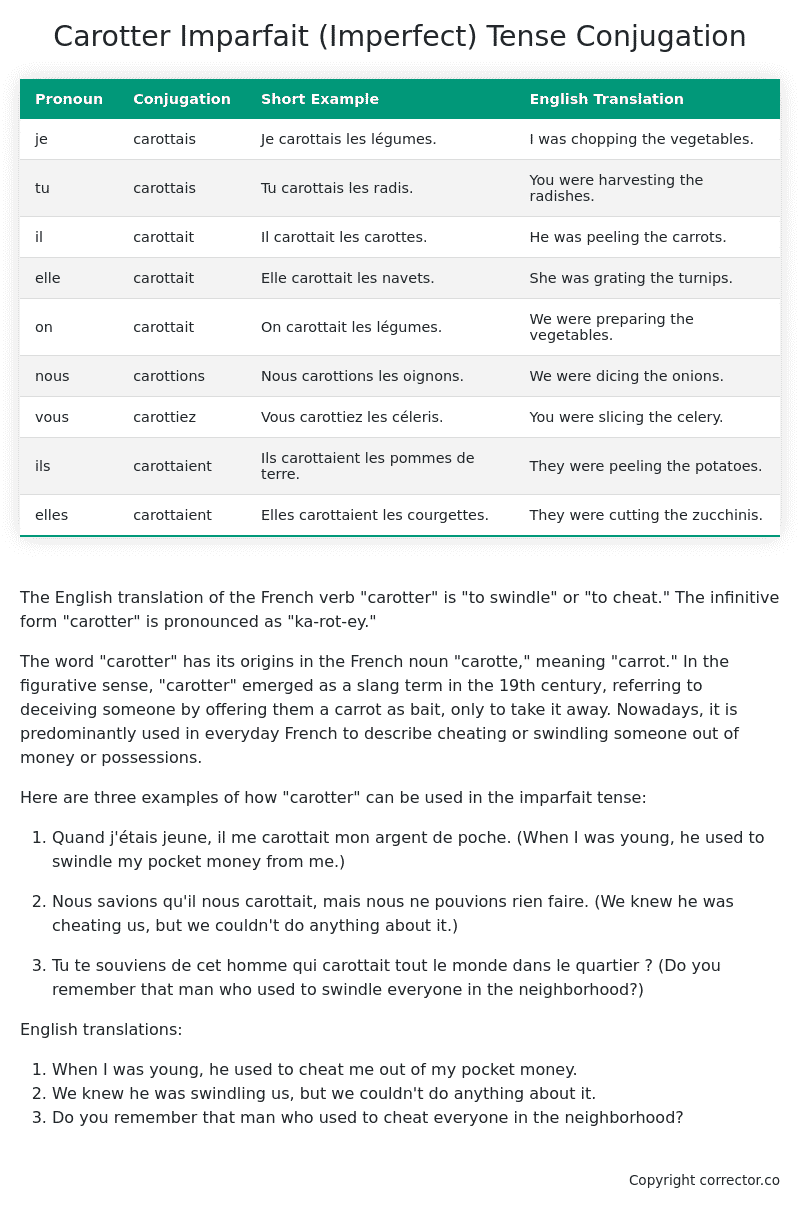Imparfait (Imperfect) Tense Conjugation of the French Verb carotter
Introduction to the verb carotter
The English translation of the French verb “carotter” is “to swindle” or “to cheat.” The infinitive form “carotter” is pronounced as “ka-rot-ey.”
The word “carotter” has its origins in the French noun “carotte,” meaning “carrot.” In the figurative sense, “carotter” emerged as a slang term in the 19th century, referring to deceiving someone by offering them a carrot as bait, only to take it away. Nowadays, it is predominantly used in everyday French to describe cheating or swindling someone out of money or possessions.
Here are three examples of how “carotter” can be used in the imparfait tense:
-
Quand j’étais jeune, il me carottait mon argent de poche.
(When I was young, he used to swindle my pocket money from me.) -
Nous savions qu’il nous carottait, mais nous ne pouvions rien faire.
(We knew he was cheating us, but we couldn’t do anything about it.) -
Tu te souviens de cet homme qui carottait tout le monde dans le quartier ?
(Do you remember that man who used to swindle everyone in the neighborhood?)
English translations:
- When I was young, he used to cheat me out of my pocket money.
- We knew he was swindling us, but we couldn’t do anything about it.
- Do you remember that man who used to cheat everyone in the neighborhood?
Table of the Imparfait (Imperfect) Tense Conjugation of carotter
| Pronoun | Conjugation | Short Example | English Translation |
|---|---|---|---|
| je | carottais | Je carottais les légumes. | I was chopping the vegetables. |
| tu | carottais | Tu carottais les radis. | You were harvesting the radishes. |
| il | carottait | Il carottait les carottes. | He was peeling the carrots. |
| elle | carottait | Elle carottait les navets. | She was grating the turnips. |
| on | carottait | On carottait les légumes. | We were preparing the vegetables. |
| nous | carottions | Nous carottions les oignons. | We were dicing the onions. |
| vous | carottiez | Vous carottiez les céleris. | You were slicing the celery. |
| ils | carottaient | Ils carottaient les pommes de terre. | They were peeling the potatoes. |
| elles | carottaient | Elles carottaient les courgettes. | They were cutting the zucchinis. |
Other Conjugations for Carotter.
Le Present (Present Tense) Conjugation of the French Verb carotter
Imparfait (Imperfect) Tense Conjugation of the French Verb carotter (You’re reading it right now!)
Passé Simple (Simple Past) Tense Conjugation of the French Verb carotter
Passé Composé (Present Perfect) Tense Conjugation of the French Verb carotter
Futur Simple (Simple Future) Tense Conjugation of the French Verb carotter
Futur Proche (Near Future) Tense Conjugation of the French Verb carotter
Plus-que-parfait (Pluperfect) Tense Conjugation of the French Verb carotter
Passé Antérieur (Past Anterior) Tense Conjugation of the French Verb carotter
Futur Antérieur (Future Anterior) Tense Conjugation of the French Verb carotter
Subjonctif Présent (Subjunctive Present) Tense Conjugation of the French Verb carotter
Subjonctif Passé (Subjunctive Past) Tense Conjugation of the French Verb carotter
Subjonctif Imparfait (Subjunctive Imperfect) Tense Conjugation of the French Verb carotter
Subjonctif Plus-que-parfait (Subjunctive Pluperfect) Tense Conjugation of the French Verb carotter
Conditionnel Présent (Conditional Present) Tense Conjugation of the French Verb carotter
Conditionnel Passé (Conditional Past) Tense Conjugation of the French Verb carotter
Conditionnel Passé II (Conditional Past II) Tense Conjugation of the French Verb carotter
L’impératif Présent (Imperative Present) Tense Conjugation of the French Verb carotter
L’impératif Passé (Imperative Past) Tense Conjugation of the French Verb carotter
L’infinitif Présent (Infinitive Present) Tense Conjugation of the French Verb carotter
L’infinitif Passé (Infinitive Past) Tense Conjugation of the French Verb carotter
Le Participe Présent (Present Participle) Tense Conjugation of the French Verb carotter
Le Participe Passé (Past Participle) Tense Conjugation of the French Verb carotter
Struggling with French verbs or the language in general? Why not use our free French Grammar Checker – no registration required!
Get a FREE Download Study Sheet of this Conjugation 🔥
Simply right click the image below, click “save image” and get your free reference for the carotter imparfait tense conjugation!

Carotter – About the French Imparfait Tense
NOTE: To take a deep dive into all the French tenses then see our article on Mastering French Tense Conjugation.
Formation of the Imparfait Tense
For regular -er verbs:
For regular -ir verbs
For regular -re verbs
Common Everyday Usage Patterns
Description of Past Habits
Background Information
Mental and Emotional States
It’s employed to express emotions, thoughts, or physical sensations in the past. For example: “J’étais content quand il est arrivé.” (I was happy when he arrived.)
Ongoing Actions
Points to Note About the Imparfait Tense
Passé Composé vs. Imparfait
Conditional
Si Clauses
Narration
I hope you enjoyed this article on the verb carotter. Still in a learning mood? Check out another TOTALLY random French verb imparfait conjugation!


